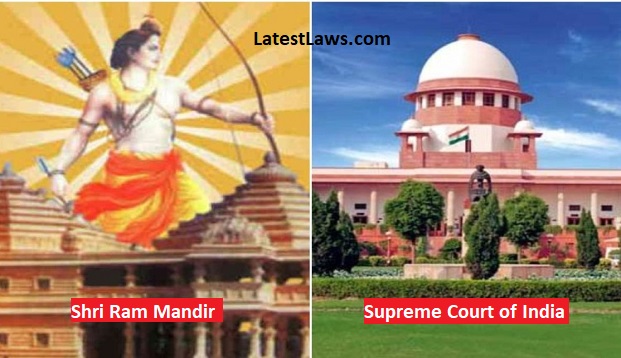February 28, 2019:
On Wednesday, the Bench of Justices R. Banumathi and R. Subhash Reddy, upholds the decision of the First Appellate Court and the High Court that Shri Ram Mandir is a public temple and not a private temple and that the agricultural lands were given to the 'Deity' and not to the 'Pujaris'.
In the present case, the High Court affirms with the findings of the First Appellate Court that Shri Ram Mandir, Indoukh is a public temple and that the suit property is vested in the Deity; and Ram Das and then Bajrang Das are only pujaris and not Mahant-Manager of the temple.
The questions that attract consideration of the Hon'ble Supreme Court are:
- whether Shri Ram Mandir is a public temple or a private temple as claimed by the appellant.
- whether the appellant is the Mahant of Shri Ram Mandir and
- whether the appellant is in control and administration of the temple and the suit properties as claimed by him.
It is observed from the facts of the case that appellant Ram Bali Das was throughout recorded only as 'pujari' of Shri Ram Mandir. On the application filed by pujari Ram Das, Bajrang Das was appointed as pujari by SDO.
Facts reveal that, Plaintiff Ram Das himself got the land in the year 1985-86 on lease for Rs.860/- from the Government and this fact that the appellant having taken the Mandir lands on lease from the Government clearly shows that the properties were never owned by the pujaris in their individual capacity.
The apex court reaffirms, ".....having taken the Mandir property on lease from the Government, the appellant is estopped from denying that the temple properties are under the management and control of the Government. The suit lands have been given in the name of Shri Ram Mandir and few other lands in the name of Ganesh Mandir for the arrangement of pooja, archana, naivedya, etc. for the public temple and the pujari has no right to interfere in the management of these lands as his status is only that of pujari."
The Bench while upholding the findings of the first appellate court and the High Court, states that Shri Ram Mandir is a public temple and not a private one. And this finding is based upon the appreciation of oral and documentary evidence.
"High Court rightly held that no substantial question of law arose in the Second Appeal. Based upon oral and documentary evidence, the First Appellate Court and the High Court have recorded the concurrent findings of fact that Shri Ram Mandir is a public temple and not a private temple and that the agricultural lands were given to the Deity and not to the pujaris.....", the Bench observes.
The Bench further observes, "Bajrang Das (PW-1) himself has been appointed as pujari by the Government and the appellant/plaintiff has not adduced any evidence showing that the temple belonged to one particular family. By oral and documentary evidence, it is clearly established that the suit lands are recorded in the name of Shri Ram Mandir."
Therefore, the Bench holds that the impugned judgment of High Court does not suffer from any infirmity and does not warrant interference of this court and the said appeal is liable to be dismissed.
Read Judgment @ LatestLaws.com
SHRI RAM MANDIR INDORE Vs STATE OF MADHYA PRADESH AND OTHERS_27-Feb-2019(Downloadable PDF)
Picture Source :

























